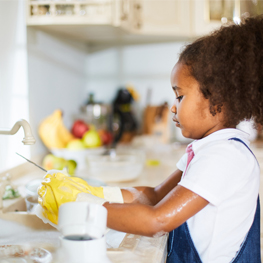
Brian Pacilio was a typical teenager: Busy with sports, school, and friends. But he was not too busy to help out with dinner dishes, do some of the laundry, take out the trash, and keep his bathroom ‘hotel ready.' That’s because for Brian’s mom, Cheryl, it was about more than getting help with housework. It was about helping her son, too. Chores can be an important part of kids’ lives. Not only do tasks at home teach life skills and allow kids to contribute to the running of the household, they also yield benefits that support your child’s academic life.
Here are a few ways chores benefit kids’ brains at different ages:
Preschool
For young children, household tasks can give them real-life experience with the skills of sorting, matching, and patterning. Have your preschooler help sort laundry into light and dark piles. Then ask them to match up socks out of the clean laundry pile. Let them put away the silverware from the dishwasher, which requires parceling out each type of utensil. Preschoolers can also help set the table, which is an exercise in patterning (fork, plate, cup, knife. Fork, plate, cup, knife).
Amy Payton, an occupational therapist, points out that “learning to clean up at home also translates to school: Hanging their jacket on a hook. Having a place for their shoes and backpack.”
Keep organization simple for this age, and they’ll have the tools for following the expectations at preschool.
Elementary School
Once children reach elementary school-age, they’re ready to take on more responsibility. And as Tara Aronson, author of Mrs. Clean Jean’s Housekeeping with Kids, says, “Chores give kids a sense of responsibility that follows through into other areas of their lives, especially school.” She also encourages parents to “invest the time now and you’ll be rewarded with a child who takes pride (if not joy) in carrying his share of the home cleaning load.”
Brain boosters for grade schoolers from housework: practicing math skills and learning how to plan. Most grade schoolers can help cook meals by working alongside mom or dad. They’ll get hands-on experience with fractions as they measure out ingredients and, with some input from an adult, can learn the science behind different aspects of cooking and baking (plus yeast recipes make for great science lessons). For younger elementary-age children, focus on estimating and comparative sizes.
For those families with garden space, school-aged children can be involved in the planning, planting, and maintaining of a garden. Planning out the division of space for different plants and measuring planting depth and distances provide a great mental workout.
Payton agrees. “[Gardening] is a great multi-step chore. Look at it as step-by-step sequencing. Have them plan out the tools needed. It can even involve research. “Kids can learn soil properties and gardening conditions, making it a great science-related chore as well.
Junior High and High School
Finding time for chores in the tween and teen years can be a challenge. But parents shouldn’t give up because of busy schedules. In fact, as her children grew older, Cheryl Pacilio added responsibilities, rather than reducing them. She tied her son’s allowance to his chores as a way to motivate him and train him in real-world economics.
Rote jobs like mowing the lawn and vacuuming can be good for teenaged brains as a mental shift. The downtime from thinking about schoolwork while getting tasks done can be both refreshing and energizing.
Chores at this age also develop other skills important to kids’ academic lives such as learning how to prioritize and working on time management. Payton points out the benefits of learning to plan related to housework - laundry, in particular. A teen might say, “I want to wear my favorite jeans on the weekend, but I forgot to wash them...”
The big idea at this age is to progressively assign more responsibility. As Pacilio notes, “The value of chores is in creating fully-functioning members of society.”
Are your kids new to housework and you’re not sure where to start? Aronson suggests starting slow. “Begin by creating a chores list with just one or two chores for each school-age kid.”
Giving kids jobs shouldn’t be looked at as a burden or a punishment. Parents need to remember that chores won’t hamper kids’ success at school, but will build
on it. “I would encourage parents to look at chores
as necessary teaching opportunities. To let your child leave the house still a child is to thwart his adulthood and cripple a society. Chores are the tools you use to create a good employee, an appreciated neighbor, and most importantly, a good spouse and parent himself,” advises Pacilio.
Suggested chores by age (each list adds on to the previously mentioned chores). Adapted from Mrs. Clean Jean’s Housekeeping with Kids.
Preschool:
Elementary-aged:
Tween:
Teen:
Lara is a parenting journalist, and a mom to three girls. She learns as much from sharing housework with her kids as they learn from her.
Calgary’s Child Magazine © 2025 Calgary’s Child